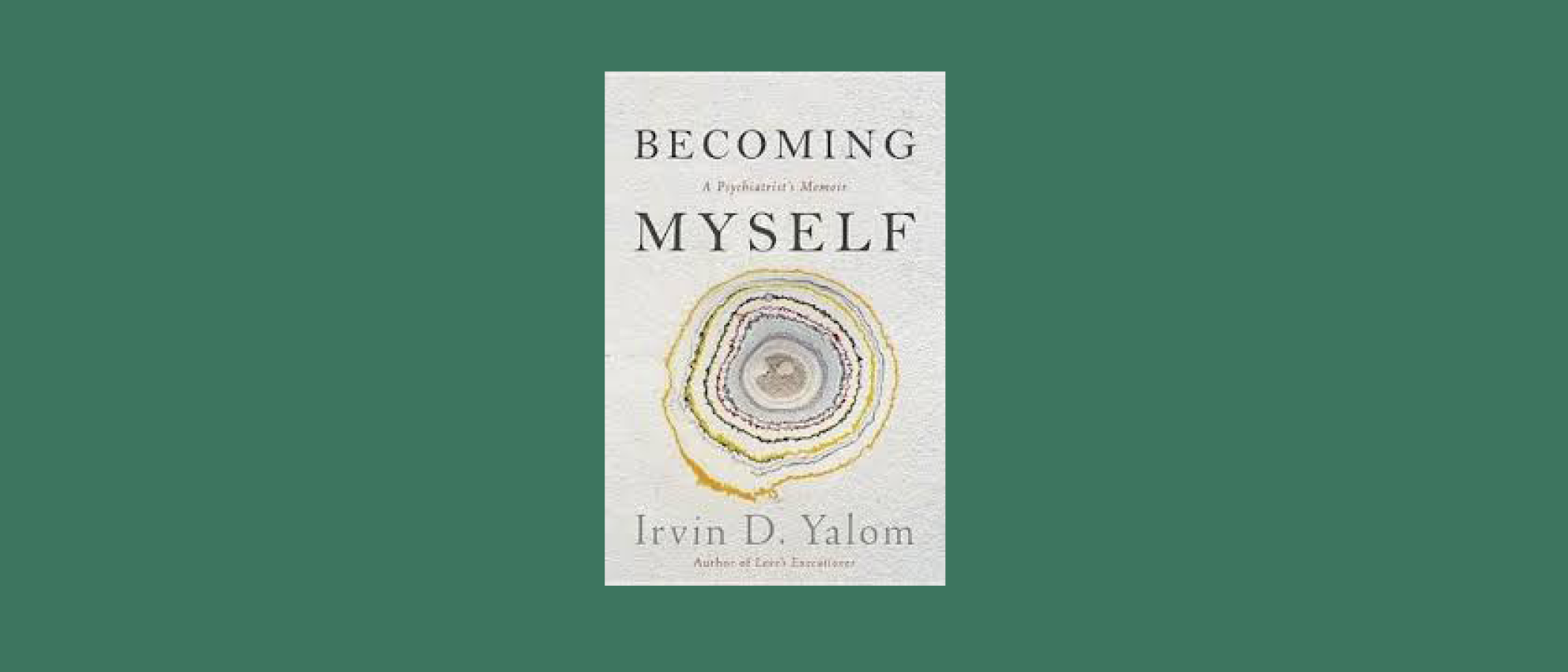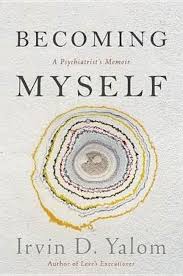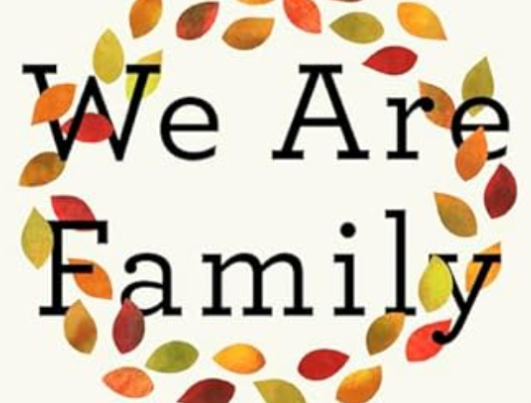
Irvin Yalom is a retired professor of psychiatry, a psychotherapist, and the author of a wide range of books, including handbooks on group psychotherapy and existential therapy, but also a number of novels. In Becoming Myself: A Psychiatrist’s Memoirs, Yalom, 85 at the time of writing, tells you his life story.
At the beginning, Yalom starts every chapter by recounting a recent event. This can be a dream, a stroll through his garden, or even a meeting with a client – in spite of his age, Yalom is still working as a psychotherapist. Yalom then goes on to recollect the childhood memories these events remind him of. This fascinating approach allows Yalom to demonstrate how the change of perspective that comes with the passage of time has altered his feelings about many situations from his past. One of the ways he demonstrates this is by imagining the conversation that would ensue if his younger self (Irv) came to his older self (dr. Yalom) for therapy.
In one of these chapters, Yalom explains how he gave the protagonist in one of his novels, Spinoza, something that he himself pined for as a child: a mentor – a theme that keeps returning throughout the book. As Becoming Myself progresses, however, Yalom comes to the conclusion that he did have a number of mentors in his life, after all. Yalom and Spinoza may have more things in common, though. The philosopher Spinoza was excommunicated from the Jewish community in Amsterdam as a young man for his religious ideas, which were controversial at the time. Young Irv, on the other hand, was expelled from the training for his Bar Mitzvah – the religious coming-of-age ritual for Jewish boys when they turn thirteen. He got into trouble over asking questions such as: ‘If Adam and Eve were the first humans, then who did their children marry?’ In his work as a psychiatrist, moreover, Yalom seems to have been skeptical of some of the more traditional methods of psychotherapy, as well.
Yalom takes a more straightforward chronologic approach when describing his adult life. Although this part of the book is more superficial, some of it may still engage you. Having worked as a therapist for over fifty years, Yalom has come across a variety of methods used in psychotherapy. One example is a very orthodox group therapist who would only indirectly address a group, by saying such things as: ‘If all the members of this group have come through the ghastly rain from the far corners of London and choose to talk about cricket, well then, that’s all right with me,’ while another example is participating in a 24 hour marathon group sessions, during which the participants would be naked.
It takes a lot of courage to look at your own life in such an open manner as Yalom does in the first chapters, let alone to share your thoughts and doubts with any stranger reading your book. Yalom’s language is rather original. For example, he notes that many patients ‘voted with their feet,’ by not showing up for a therapy they found unhelpful. Although the later chapters are not up to the high standard of the beginning, the honest and ingenuous writing still make Becoming Myself a fascinating read.
Available at your local book store or online, starting from €15,99. A Dutch translation is also available: Dichtbij het einde, terug naar het begin – memoires van een psychiater, starting from €28,99.

Irvin Yalom is a retired professor of psychiatry, a psychotherapist, and the author of a wide range of books, including handbooks on group psychotherapy and existential therapy, but also a number of novels. In Becoming Myself: A Psychiatrist’s Memoirs, Yalom, 85 at the time of writing, tells you his life story.
At the beginning, Yalom starts every chapter by recounting a recent event. This can be a dream, a stroll through his garden, or even a meeting with a client – in spite of his age, Yalom is still working as a psychotherapist. Yalom then goes on to recollect the childhood memories these events remind him of. This fascinating approach allows Yalom to demonstrate how the change of perspective that comes with the passage of time has altered his feelings about many situations from his past. One of the ways he demonstrates this is by imagining the conversation that would ensue if his younger self (Irv) came to his older self (dr. Yalom) for therapy.
In one of these chapters, Yalom explains how he gave the protagonist in one of his novels, Spinoza, something that he himself pined for as a child: a mentor – a theme that keeps returning throughout the book. As Becoming Myself progresses, however, Yalom comes to the conclusion that he did have a number of mentors in his life, after all. Yalom and Spinoza may have more things in common, though. The philosopher Spinoza was excommunicated from the Jewish community in Amsterdam as a young man for his religious ideas, which were controversial at the time. Young Irv, on the other hand, was expelled from the training for his Bar Mitzvah – the religious coming-of-age ritual for Jewish boys when they turn thirteen. He got into trouble over asking questions such as: ‘If Adam and Eve were the first humans, then who did their children marry?’ In his work as a psychiatrist, moreover, Yalom seems to have been skeptical of some of the more traditional methods of psychotherapy, as well.
Yalom takes a more straightforward chronologic approach when describing his adult life. Although this part of the book is more superficial, some of it may still engage you. Having worked as a therapist for over fifty years, Yalom has come across a variety of methods used in psychotherapy. One example is a very orthodox group therapist who would only indirectly address a group, by saying such things as: ‘If all the members of this group have come through the ghastly rain from the far corners of London and choose to talk about cricket, well then, that’s all right with me,’ while another example is participating in a 24 hour marathon group sessions, during which the participants would be naked.
It takes a lot of courage to look at your own life in such an open manner as Yalom does in the first chapters, let alone to share your thoughts and doubts with any stranger reading your book. Yalom’s language is rather original. For example, he notes that many patients ‘voted with their feet,’ by not showing up for a therapy they found unhelpful. Although the later chapters are not up to the high standard of the beginning, the honest and ingenuous writing still make Becoming Myself a fascinating read.
Available at your local book store or online, starting from €15,99. A Dutch translation is also available: Dichtbij het einde, terug naar het begin – memoires van een psychiater, starting from €28,99.




